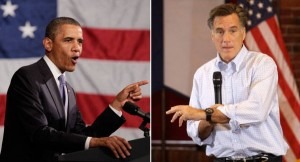You’ll often hear the words “freedom” and “liberty” thrown around in the Presidential campaign. What those words mean to each candidate, though, differs greatly. Here’s a quick look:
- For Republican challenger Mitt Romney, liberty refers in large part to economic freedom -- not being unduly taxed and reducing government spending on various programs. For instance, he doesn’t think the government should be funding PBS or Planned Parenthood. His economic philosophy essentially boils down to: smaller government = a truly free market = economic freedom. For his part, President Barack Obama agrees that personal liberty is closely related to economic freedom, but also stresses that the social safety net (which includes many of the programs Romney intends to reduce) is meant to build prosperity and increase economic freedom.
- For Obama, one part of Personal Liberty means giving women the right to a full range of choices for family planning, including access to abortion. Obama argues, "women are capable of making these decisions in consultation with their partners, with their doctors, and for politicians to want to intrude in this stuff often times without any information is a huge problem." His healthcare law requires employers to cover contraceptives for women enrolled in their workplace health plans. Romney opposes abortion and has hinted that he would appoint Supreme Court justices that would overturn Roe v. Wade.
- Romney argues that the Obama-passed Affordable Care Act(ACA) tramples on people’s liberty because it limits healthcare choices “for millions of Americans,” and causes them “to lose the insurance coverage they already have.” Even worse, Romney continues, the ACA “empowers bureaucrats to make healthcare decisions” for citizens themselves. Not only has Obama said that Romney’s claims are blatantly “false,” but he has argued in the past that healthcare should be a right.
- One of Obama’s most well-known actions as president was repealing “Don’t ask, Don’t tell,” which was largely considered a victory for the gay community. Just as notably, Obama became the first sitting president to endorse gay marriage. However, he still argues that gay marriage should be a states' issue. Romney believes that only “traditional” marriage – between a man and woman – should be recognized, and he believes that this recognition is “critical for the well-being of civilization,” especially in regards to raising children.
- Of course, there are more than just two candidates running for the presidency, with Libertarian candidate Gary Johnson and Green Party candidate Jill Stein chief among the challengers, and these candidates offer different perspectives on liberty issues. Both Johnson and Stein believe that the Drug War is an egregious attack on personal liberties. They also oppose provisions in The National Defense Authorization Act, which allows roving wiretaps and indefinite detentions of individuals suspected of being terrorists. You can see both their positions on these issues, as well as many others, in this review of the Third Party Debate.
As for other traditional liberty issues, Romney and Obama are mostly of the same opinion. Both promise to protect the right to bear arms, though there is disagreement over an assault-weapons ban. Both candidates are for maintaining the prohibition of marijuana, and neither intends to limit the Patriot Act. Thus, when it comes to personal liberty, the candidates are just as often in agreement as they are in disagreement. In any case, both claim to be the authority on this issue. It’s up to you to choose.
